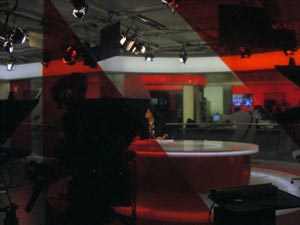Olivia Alabaster reports on an event last night looking at the history of war reporting – from the days of highly politicised, imperialistic battle accounts when officer-journalists were generally respected and welcomed; to the issues of modern-day war reporting, where journalists themselves can be targets for attack and kidnapping.
David Loyn, foreign correspondent for the BBC, opened the lecture with a brief introduction to war reporting in the late 19th century, with excerpts taken from his book, Butcher and Bolt, which details 100 years of war coverage in Afghanistan.
Commenting on journalism after World War I, Loyn explained how many Fleet Street journalists received knighthoods for service to their country, including their deeply nationalistic writing, which, he suggested, may well have affected the outcome of the war:
“Wouldn’t the course of that war been very different if they had reported what it was really like?”
An interesting concept, and one which is extremely relevant given the current coverage of the wars in Iraq and Afghanistan. To what extent can media outlets be held accountable for public support for international conflicts and, in turn, how these conflicts pan out?
Stephen Robinson, journalist and biographer of Bill Deedes, the reporter who allegedly inspired antihero protagonist William Boot in Evelyn Waugh’s novel ‘Scoop’, spoke of the importance of the Abyssinian conflict in the history of war.
Not only was Abyssinia ‘Mussolini’s test running of military fascism’, but it revealed the first failings of the then League of Nations and Robinson draws a direct line from this conflict to WWII.
It is perhaps because of the sheer importance of this war that Robinson so berates Waugh, who was a correspondent for the Daily Mail in Abyssinia, for his failings as a journalist at this time. While admiring Waugh as a novelist, Robinson believes he was guilty of missing the real crux of the Abyssinian conflict, and that he was, ‘completely morally blind (…) and he claimed, monstrously, that only a dozen Abyssinians had been killed’.
Colin Smith, who has written primarily for the Guardian and the Observer, discussed the growing immediacy to war reporting in the late 20th century. As he put it: “You can have the best story in the world, but if you can’t get it back, then it’s useless.”
He described a painful example of his own experience of this: Smith once sneaked illegally into Dhaka during the 1971 Indo-Pakistan war, eventually managing to file his story in Calcutta using the US Consulate’s phone (the British Consulate wouldn’t let him, fearing for its own safety), only for the Associated Press to get there before him…
Embedded journalists
A panel discussion at the event, including Colin Freeman, chief foreign correspondent at the Sunday Telegraph, then discussed contemporary issues facing war reporting. On the topic of embedding within the military, Loyn said it does not result in a lack of independent coverage.
“If you are embedded, you don’t trade your objectivity, you trade your freedom of movement,” he said.
But Robinson said a journalist cannot remain neutral in such situations: “If you are embedded in the US or the UK army, you will see things from their perspective.”
Journalists as hostages
The panel also discussed the issue of journalists now being ‘prizes’ for kidnappers, of which Freeman has experience – when investigating piracy in Somalia last year, he was kidnapped and kept in a cave for six weeks.
Whereas in the past insurgents wanted to share their stories, they now have more opportunities to manipulate many media outlets, and so are less reliant on the traditional news channels, the panel discussed.
Afghanistan as a return to tradition?
According to the panel, there are elements of reporting on the current Afghanistan conflict that bring war reporting back full circle to its 19th-century origins: most of the footage the public see is filmed by soldiers themselves, as in the 19th century when reporters tended to be officers. This ‘reporting’ raises its own important questions about objectivity.
Olivia Alabaster is an MA Newspaper Journalism student at City University, London. She tweets at @OliviaElsie and blogs at http://abgv844.portfolios.cutlines.org/.
 Coventry University’s Teo Beleaga gives us a student’s eye view of the BBC’s multimedia newsroom.
Coventry University’s Teo Beleaga gives us a student’s eye view of the BBC’s multimedia newsroom.